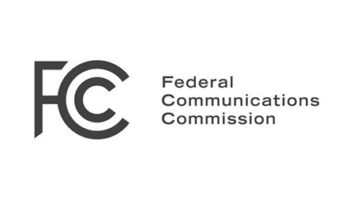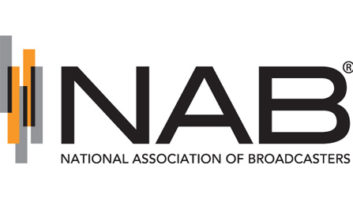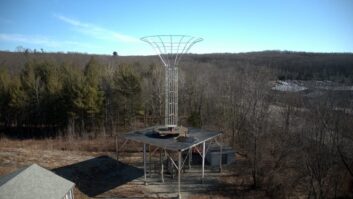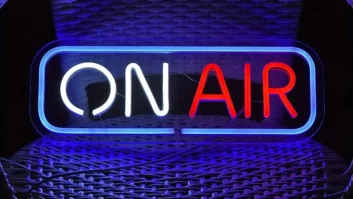A university in New Mexico has been told to stop using a satellite link to deliver its FM signal to a translator in Texas.
The outcome reminds us of the rule that noncom educational translators operating in the non-reserved part of the FM band are prohibited from alternate methods of signal delivery — a restriction that the FCC’s Media Bureau says the school had been “flouting” for a decade.
The case involves Eastern New Mexico University and its translator in Midland, Texas. It airs on 99.5 MHz.
According to an FCC summary, at one time ENMU fed the signal of Maljamar, N.M., station KMTH(FM) to that Midland translator about 130 miles away, reaching it by a relay from another translator between the two.
In 2006, a new full-service FM was built in Midland whose operations interfered with ENMU’s reception of the intermediate hop. The university’s engineers concluded that satellite delivery was the only viable means to continue the translator service, according to an FCC summary; and for the next eight years or so, ENMU fed Midland that way.
But this, the commission said, violates the rule we mentioned at the top. ENMU, perhaps accustomed to operating under reserved-band rules, where the strictures on translators are slightly different, apparently didn’t realize that.
In 2013, it filed to renew the translator, intending to rebroadcast a different station and still making no mention of its signal delivery. The FCC staff granted that, unaware of the feed setup. Soon after, the school got a minor change application for the translator, but the CP contained an operating condition requiring it to demonstrate that the translator could rebroadcast KMTH as required by the rules.
Now aware of the situation, the school sought a waiver to keep receiving by satellite. It said the translator meets several important waiver conditions. It also laid out several other arguments, among them: Midland is an underserved market with “wide expanses of territory” that make other technical signal delivery options “less feasible and prohibitively expensive.” Its noncom educational status puts it in a relatively unique situation. Also, the rule restricting signal delivery was only intended to prevent commercial stations from encroaching upon each other’s service areas. Further, a waiver was warranted because the expansion of NCE radio has led to overcrowding in the reserved band; and “difficult geographic or topographic features” limit service to this remote area.
In late 2015, the FCC staff said no to all this; it issued a brief public notice saying its “prior actions leave no room for waiver of the delivery rule for the operation of other area translators in the absence of a white area showing.” It cited a past case as well as a subsequent amendment to its translator rules as justification.
The school then came back with a petition for reconsideration. It felt the decision had been “perfunctory, demonstrating a complete lack of reflection, and a hasty, superficial and automatic response to the concept of waiver itself.” It said the FCC failed to give its request a required “hard look” and called it handling arbitrary and capricious. It said that as an NCE translator it does not compete economically with commercial stations, so a waiver would not undermine the rationale of the rule.
Now the FCC has ruled that ENMU didn’t demonstrate an error in the order or raise new facts. It said its public notice had explained the matter clearly if briefly, and that it’s nothing new for the commission staff to use public notice comments to address an argument. Waiver requests, it added, face a high hurdle involving special circumstances and public interest.
“By amending the FM translator rules, the commission sought to tailor the rules to more closely reflect translators’ original secondary role,” Audio Division Chief Peter Doyle wrote. “The commission concluded that waiver … should be available only upon a showing of service to a ‘white area,’ that is, an area outside the coverage contour of any full-time aural broadcast service,” and he said no such area was involved here.
He said the bureau has refused arguments that a waiver may be based on “either provision of a second service to a ‘gray’ area or the provision of an additional service to an underserved area which received fewer than five aural services.” And he rejected the university’s other arguments.
Nor, he said, does the outcome undermine the rule. “By allowing NCE FM translators in the reserved band to use alternative signal delivery methods, the commission sought to serve the public interest by ‘facilitating improvements in the quality of signals’ such translators rebroadcast and enabling them to reach larger numbers of listeners who desire NCE service — including those in more remote geographic areas, while not altering translator’s secondary status.” That limited restriction, applicable only to NCE stations in the reserved band, remains consistent with translator policy, he wrote.
“ENMU has not demonstrated special circumstances warranting deviation from the rule, and we emphatically reject the notion that ENMU’s decade-long flouting of the Signal Delivery Rule provides any basis for the relief it seeks,” he wrote. He said the FCC would be justified in issuing a notice of apparent liability, meaning possibly a fine; but given that the FCC public notice “did not specifically order ENMU to cease the unlawful satellite feed,” he instead admonished the university and ordered it to stop the use of a satellite feed, saying future transmissions using that method would raise the possibility of further enforcement action.
There is a good overview of the FCC rules about translators and boosters here. You can read the Doyle ruling here (PDF).











